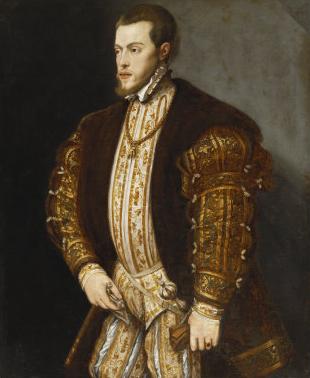Beschreibung
The painting "Philip II of Spain", created by Titian in the year 1550, is a masterpiece that encapsulates not only the greatness of the Spanish monarch, but also the technical prowess and innovative artistic vision of the Venetian Renaissance. Titian, recognized as one of the most influential painters of his time, achieves in this work a portrait that goes beyond mere physical representation; it becomes a symbol of the power and solemnity of Philip II, who was king of Spain and Portugal, known for his firmness in defending the Catholic faith and his imperial legacy.
The composition of the painting is remarkably austere and structured in such a way that the viewer cannot help but be drawn towards the central figure. Philip II is shown standing against a dark, neutral background, allowing him to stand out with an almost monumental presence. His upright, serene posture conveys authority and dignity at the same time, highlighting the status and responsibility that came with being a monarch. He wears a majestic black suit, adorned with elaborate details that illustrate his social position, such as a richly textured cape and a pearl necklace that frames his neck. Titian uses light masterfully, softly illuminating the king's figure and highlighting his facial features, which convey both the monarch's strength and introspection.
The use of colour in this work is crucial to the transmission of the psychology of Philip II. Titian opts for a predominantly dark palette, with shades of black and grey, which evoke an atmosphere of seriousness. However, subtle touches of light and colour bring the painting to life. The use of gold on the edges of the clothing and the glow in some details of the suit provide a shine that contrasts with the gloom of the background, perhaps symbolising the wealth of the crown and the inserted struggles that accompanied it.
An interesting aspect of this work is how Titian manages to capture the essence of Philip II’s character through his subtle expressions. The king maintains a contemplative gaze, suggesting a sense of reflection and doubt that is remarkable given the historical context in which he ruled, filled with political and ecclesiastical challenges. This becomes a testament to Titian’s talent for infusing meaning into realistic portraits; rather than just showing the king as an austere monarch, he manages to humanize him.
Comparing this work to other portraits of the period, one can see that Titian pioneered the use of colour and light, an approach that laid the groundwork for future generations of artists. His interpretation of the royal figure stands out from that of other contemporaries, who often opted for more rigid and less emotive depictions. Titian, on the other hand, reveals the complexities of the human being behind the status.
In short, “Philip II of Spain” is not only a stunning portrait, but also a profound commentary on power, identity, and the monarch’s personal dilemmas. Titian’s ability to combine masterful technique with the capture of human character makes this work a fundamental element in the study of Renaissance art and portraiture as a genre. In its simplicity, the work transcends time, allowing the viewer a connection with a historical figure and a moment in history that remains relevant today.
KUADROS ©, a famous painting on your wall.
Hand-made oil painting reproductions, with the quality of professional artists and the distinctive seal of KUADROS ©.
Painting reproduction service with satisfaction guarantee. If you are not completely satisfied with the replica of your painting, we will refund 100% of your money.

